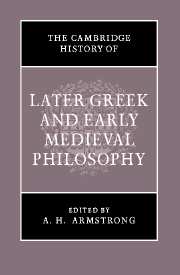Book contents
- Frontmatter
- Chapter 1 Introductory
- Part 1 GREEK PHILOSOPHY FROM PLATO TO PLOTINUS
- Part II PHILO AND THE BEGINNINGS OF CHRISTIAN THOUGHT
- Part III PLOTINUS
- Part IV THE LATER NEOPLATONISTS
- Part V MARIUS VICTORINUS AND AUGUSTINE
- Part VI THE GREEK CHRISTIAN PLATONIST TRADITION FROM THE CAPPADOCIANS TO MAXIMUS AND ERIUGENA
- Part VII WESTERN CHRISTIAN THOUGHT FROM BOETHIUS TO ANSELM
- Chapter 35 Boethius and the legacy of antiquity
- Chapter 36 Development of thought in the Carolingian Empire
- Chapter 37 The debate on philosophical learning during the transition period (900–1080)
- Chapter 38 Anselm of Canterbury: the philosophical interpretation of faith
- Part VIII EARLY ISLAMIC PHILOSOPHY
- Select Bibliography
- Additional Notes and Bibliography
- Index of ancient and medieval works referred to in the text
- General Index
- Index of Greek terms
- References
Chapter 38 - Anselm of Canterbury: the philosophical interpretation of faith
from Part VII - WESTERN CHRISTIAN THOUGHT FROM BOETHIUS TO ANSELM
Published online by Cambridge University Press: 28 March 2008
- Frontmatter
- Chapter 1 Introductory
- Part 1 GREEK PHILOSOPHY FROM PLATO TO PLOTINUS
- Part II PHILO AND THE BEGINNINGS OF CHRISTIAN THOUGHT
- Part III PLOTINUS
- Part IV THE LATER NEOPLATONISTS
- Part V MARIUS VICTORINUS AND AUGUSTINE
- Part VI THE GREEK CHRISTIAN PLATONIST TRADITION FROM THE CAPPADOCIANS TO MAXIMUS AND ERIUGENA
- Part VII WESTERN CHRISTIAN THOUGHT FROM BOETHIUS TO ANSELM
- Chapter 35 Boethius and the legacy of antiquity
- Chapter 36 Development of thought in the Carolingian Empire
- Chapter 37 The debate on philosophical learning during the transition period (900–1080)
- Chapter 38 Anselm of Canterbury: the philosophical interpretation of faith
- Part VIII EARLY ISLAMIC PHILOSOPHY
- Select Bibliography
- Additional Notes and Bibliography
- Index of ancient and medieval works referred to in the text
- General Index
- Index of Greek terms
- References
Summary
The impact of the Berengarian controversy
Anselm of Canterbury (1033–1109) in his literary work opened a new and highly individual chapter in the great controversy about the relationship of reason and belief. Before he became Primate of England in 1093 he had lived, studied and taught as a Benedictine in the Norman abbey of Bec, in contact with the spiritual and intellectual movements which at this time had their centre in the French-speaking countries of Western Europe. He had come from Aosta in the south-east corner of ancient Burgundy near the Lombard border. From his mother's side he was related to an important family of dynasts ruling in these parts. As a young man he was attracted by the revival of learning in France, like the Lombard Lanfranc before him, who in the fifties was prior of the newly founded monastery of Bec and had established there a school of some renown. Anselm joined him, first as a secular student and in 1060 as a monk. At this moment Lanfranc was deeply involved in the controversy with Berengar; he had attended the council of Rome, where the teaching of the famous master of Tours was condemned. When Anselm joined the monastic community this had been the great event of the previous year. Lanfranc himself was considered a pioneer in the revival of dialectical studies, and he was certainly anxious to strike the right balance between loyalty to the authority of biblical and ecclesiastical tradition and interest in a technically correct argument. Anselm remained in intimate contact with him for three years and became his successor as prior and head of the school, when Lanfranc left Bec on his appointment as abbot of St Stephens in Caen.
- Type
- Chapter
- Information
- Publisher: Cambridge University PressPrint publication year: 1967



